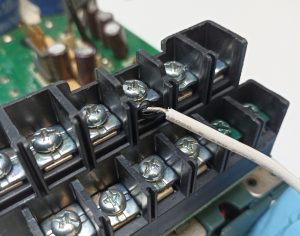Despite both looking more or less the same, these two types of grease are very different from each other and have two very different purposes. Dielectric grease is meant for protecting equipment, and conductive greases are meant to help electricity flow from one side of an electrical connection to the other side.
Dielectric grease, which is also referred to as non-conductive or insulating grease, does not provide any electrical conductivity, but it does provide dielectric insulation which helps resist the flow of an electric current through materials like air and water. However, it IS possible for dielectric grease to cause a short if specific conditions are met. Conductive Grease on the other hand provides some electrical conductivity, meaning that it has an ability to transmit electricity by conduction in addition to providing dielectrics.
Which grease should I use to protect my equipment?
Dielectric grease is useful when you need to prevent corrosion from taking place on equipment that has a metal or non-conductive surface, whereas conductive grease can be applied to any type of metal for the purpose of increasing its electrical conductivity. Dielectric Grease also provides protection against moisture and atmospheric conditions such as humidity while Conductive Grease does not provide this level of protection.
Dielectric greases have been tested up to 5000 volts per ASTM D1415 standard which means they will work great in most electronic applications where voltage levels are below 1000V AC/DC.
Dielectric greases come in either an organic base oil based formula or synthetic material base formulation so it’s important to know what your application requires. Dielectric greases work best when applied at a level of between 50 and 150 degrees Fahrenheit, however they can be used in temperatures as low as -40 or even higher than 300 degrees Fahrenheit depending on the type of grease you use. Dielectrics are typically made from silicone oil based compounds that provide long term protection against moisture, air and other atmospheric contamination which means dielectric grease is great for applications where corrosion resistance is required such as electrical connectors, switches or plugs that come into contact with water or moist environments like marine vessels and power tools.
Dielectric Grease provides this kind of high voltage insulation needed to protect electronic components while Conductive Grease may not always meet these requirements since it has less insulating ability compared to other Dielectric Greases.
Which grease should if I want better electrical conductivity?

Conductive grease, which is a mixture of graphite and silicone oil. Conductive grease has no resistance to electricity because it contains carbon particles that are small enough for the electrons in the electrical current flow through them with ease.
Conductive grease is ideal for use with very high voltage equipment, where the electricity can be extremely high. Conductive grease also helps to dissipate heat away from electronic circuits and components which allows them to operate at a more efficient level. Conduct-Tech conductive silicone greases are available in both anti-corrosion (AC) and non-corrosion (NC) formulations. Conductive silicone greases are a good choice for high temperature applications where the electrical resistance is not critical and an anti-corrosion formulation would be preferred to prevent corrosion of metal surfaces by corrosive contaminants in the environment. Dielectric grease, which has a higher dielectric strength than conductive grease, but offers nothing to dissipate heat.
Summary of Dielectric Grease Vs. Silicone Grease Conduct
- Conductive grease is usually made of carbon particles and other conductive materials
- Conductive grease can be used to lube electrical connections or as a corrosion inhibitor for metals. It will not work on plastics, rubber, ceramics or glass. Some examples of where it could be utilized are in circuit boards protectors, around circuit joints, fuses terminals & power supplies contacts.
- Dielectric grease uses silicon dioxide particles that have been milled into tiny spherical balls with mineral oil being the carrier fluid/base material mixed together during production. It has good chemical resistance but poor thermal stability. Its main use is providing protection from moisture by creating an airtight seal moving parts which means if you apply it correctly it will not migrate.
- Conductive grease has better thermal stability than dielectric grease which makes it useful up to 400°F (204°C). Conductive greases also have electrical conductivity and therefore can transfer current between two points, whereas dielectrics cannot; this is particularly important where corrosion protection and the ability of a compound to withstand applied voltages are necessary.
